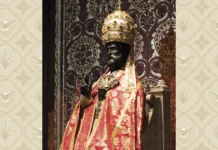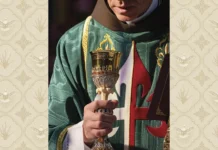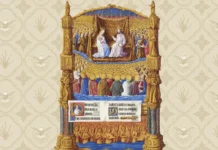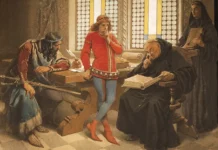When the Church appears to be buffeted and almost capsized in the raging storm, it is then that she comes forth fairer, stronger, purer, and brighter with the lustre of distinguished virtues.
You know very well, Venerable Brethren, that even when surrounded by tribulation, the Church still enjoys some consolation from God. “Christ also loved the Church, and delivered himself up for her, that He might sanctify her… in order that He might present to himself the Church in all her glory, not having spot or wrinkle or any such thing, but that she might be holy and without blemish” (cf. Eph 5:25-27).

God makes error aid in the triumph of truth
When vice runs wild, when persecution hangs heavy, when error is so cunning that it threatens her destruction by snatching many children from her bosom (and plunges them into the whirlpool of sin and impiety) – then, more than ever, the Church is strengthened from above. Whether the wicked will it or not, God makes even error aid in the triumph of truth whose guardian and defender is the Church. He puts corruption in the service of sanctity, whose mother and nurse is the Church. Out of persecution He brings a more wondrous “freedom from our enemies.”
For these reasons, when worldly men think they see the Church buffeted and almost capsized in the raging storm, then she really comes forth fairer, stronger, purer, and brighter with the lustre of distinguished virtues.
In such a way God’s goodness bears witness to the divinity of the Church. He makes her victorious in that painful battle against the errors and sins that creep into her ranks. Through this victory He verifies the words of Christ: “The gates of hell shall not prevail against it” (Mt 16:18). In her day-to-day living He fulfils the promise, “Behold, I am with you all days, even unto the consummation of the world” (Mt 28:20).
Finally, He is the witness of that mysterious power of the other Paraclete (who Christ promised would come immediately after His ascension into Heaven), who continually lavishes His gifts upon her and serves as her defender and consoler in all her sorrows. This is the Spirit who will “dwell with you forever, the Spirit of truth whom the world cannot receive, because it neither sees Him nor knows Him… He will dwell with you and be in you” (cf. Jn 14:17).
The life and strength of the Church flows forth from this font. As the ecumenical Vatican Council teaches, this divine power sets the Church above every other society by those obvious notes which mark her “as a banner raised up among the nations.”1
Without blemish in the holiness of her doctrine and law
In fact, only a miracle of that divine power could preserve the Church, the Mystical Body of Christ, from blemish in the holiness of her doctrine, law, and her end in the midst of the flood of corruption and lapses of her members. Her doctrine, law and end have produced an abundant harvest, while the faith and holiness of many of her children have brought forth the most salutary fruits.
Here is another proof of her divine life: in spite of a great number of pernicious opinions and great variety of errors (as well as the vast army of rebels) the Church remains immutable and constant, “as the pillar and foundation of truth,” in professing one identical doctrine, in receiving the same Sacraments, in her divine constitution, government, and morality. […]
They called themselves reformers, but they were corrupters
This wonderful working of Divine Providence in the Church’s program of restoration was seen with the greatest clarity and was given as a consolation for the good especially in the century of St. Charles Borromeo.
In those days, passions ran riot and knowledge of the truth was almost completely twisted and confused. A continual battle was being waged against errors. Human society, going from bad to worse, was rushing headlong into the abyss. Then those proud and rebellious men came on the scene who are “enemies of the Cross of Christ… Their god is the belly… they mind the things of earth” (cf. Phil 3:19).
These men were not concerned with correcting morals, but only with denying dogmas. They dropped the reins of law, and unbridled licentiousness ran wild. They despised the authoritative guidance of the Church and pandered to the whims of the dissolute princes and people. They tried to destroy the Church’s doctrine, constitution and discipline. They were similar to those sinners who were warned long ago: “Woe to you that call evil good, and good evil” (Is 5:20). They called this rebellious riot and perversion of faith and morals a reformation, and themselves reformers. In reality, they were corrupters. […]
Be transformed that you may discern the will of God
The Church knows very well that “the imagination and thought of man’s heart are prone to evil” (cf. Gn 8:21). Therefore, she wages continual battle against vice and error “in order that the body of sin may be destroyed, that we may no longer be slaves to sin” (cf. Rom 6:6).
Since she is her own mistress and is guided by the grace which “is poured forth in our hearts by the Holy Spirit,” she is directed in this conflict in thought and action by the Doctor of the Gentiles, who says, “Be renewed in the spirit of your mind…” (Eph 4:23); “And be not conformed to this world, but be transformed in the newness of your mind, that you may discern what is the good and acceptable and perfect will of God” (Rom 12:2).
The true son of the Church and reformer never thinks he has attained his goal. Rather, with the Apostle, he acknowledges that he is only striving for it: “Forgetting what is behind, I strain forward to what is before, I press on towards the goal, to the prize of God’s heavenly call in Christ Jesus” (Phil 3: 13-14).
Through our union with Christ in the Church we grow up “in all things in Him who is the Head, Christ. For from Him the whole body… derives its increase to the building up for itself in love…” (cf. Eph 4:15-16). For that reason, Mother Church daily fulfils the mystery of the Divine Will which is “to be dispensed in the fullness of the times: to re-establish all things in Christ” (cf. Eph 1:10).
The origin of the apostasies is the same: the enemy of man
The reformers that Borromeo opposed did not even think of this. They tried to reform the Faith and discipline according to their own whims. Venerable Brethren, it is no better understood by those whom We must withstand today. These moderns, forever prattling about culture and civilization, are undermining the Church’s doctrine, laws, and practices. They are not overly concerned for culture and civilization, but by using such high-sounding words they think they can conceal the wickedness of their schemes.
What are, in fact, their objectives, subterfuges, and the paths they intend to follow? All of you know them, and on Our part We have denounced and condemned their scheming. They are proposing a universal apostasy from the Faith and discipline of the Church, an apostasy even worse than the one that threatened the age of Charles. It is worse, We say, because it stealthily creeps into the very veins of the Church, hides there, and cunningly pushes erroneous principles to their ultimate conclusions. ◊
Excerpts from: ST. PIUS X. Editæ Saæpe,
26/5/1910
Notes
1 FIRST VATICAN COUNCIL. Dei Filius, c.III.







